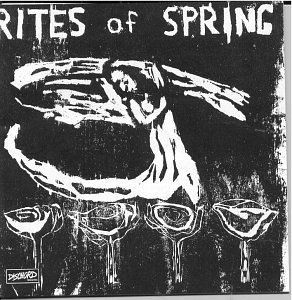
Before the formation of Fugazi, there was a band that was every bit as good.
Depending on whether or not you've ever done a bit of research into the history of a certain infamous three-letter term, you may or may not already be familiar with Rites of Spring. Yes, they are often credited as being the originators of emo - or, that is to say, emotional hardcore. Obviously the real value of this term is highly disputable - as Picciotto said himself, "honestly, I just thought that all the bands I played in were punk rock bands. The reason I think it's so stupid is that - what, like the Bad Brains weren't emotional? What - they were robots or something? It just doesn't make any sense to me." As such, it makes more sense to think of Rites of Spring as a hardcore punk band for the purpose of this post, as it will also aid in understanding why the band were so important.
You see, context is everything if one wishes to properly appreciate Rites of Spring. Imagine this: the year is 1985. The DC hardcore scene is stagnating. Its giants, the likes of Bad Brains, Minor Threat and Black Flag, are showing signs of slowing down. Cracks were beginning to show in the movement: Hüsker Dü and their ilk were already taking steps to destroy hardcore as most people knew it, integrating more of a pop sensibility and elements of other styles into the otherwise straightforward, aggressive punk that had been established as the trademark DC sound. Suddenly, out of nowhere came an album on the legendary Dischord Records that used the hardcore blueprint, but introduced a new sense of pacing and melody that had barely been seen in the genre before. Not only this, but Picciotto's lyrics forsook the usual outwardly directed anger of most DC hardcore, instead favouring subtlety, depth and introspection. This, combined with his desperately passionate delivery, resulted in music that was unusually personal and emotional. It is interesting to note the staggering difference in lyrical depth between Rites of Spring and other DC hardcore bands - for the sake of contrast, here is a sample from perhaps the quintessential DC hardcore band, Minor Threat:
I don't want to hear it
All you do is talk about you
I don't want to hear it
'Cause I know that none of it's true
I don't want to hear it
Sick and tired of all your lies
I don't want to hear it
When are you gonna realize...
That I don't want to hear it
Know you're full of shit
-Minor Threat; I Don't Want to Hear It
Note that the lyrics are to the point and simple, full of outwardly directed anger. Compare this to the following sample from Rites of Spring's 'All There Is' and the difference is positively startling:
It's more than love
And it's less than love
It's what I give to you.
All there is is the knowing that this never had to end.
All there is to know.
If I could take, heart in hand, what I'd give to you.
All there is is in the knowing that this never has to end.
All there is to know.
-Rites of Spring; All There Is
The subject matter here is much more abstract and vague; far more personal and emotional than the former sample, dealing with deeper thoughts and ideas, using much more subtlety and leaving parts to speculation. Picciotto also had a notable sense of wit, providing a dry sense of humour in For Want Of''s declaration of "I woke up this morning with a piece of past caught in my throat... and then I choked" 0r Persistent Vision's "I was the champion of forgive-forget, but I haven't found a way to forgive you yet". Rites of Spring opened people up to the idea that hardcore could cover a greater spectrum of emotion than simply anger.
Picciotto's voice is awe-inspiring here, too. His unhinged delivery in Rites of Spring makes his contributions in Fugazi sound positively tame - a passionate, gravelly rasp that breaks into a desperate yelp at emotional climaxes. The band's songwriting made use of a pop sensibility that gives them a sense of immediacy that separated them from less accessible early emo bands such as Moss Icon's labyrinthine spoken word passages.
And the band's importance doesn't stop at the invention of emo - there is even a precocious post-hardcore gem in the form of album highlight 'Drink Deep'. The song sounds startlingly similar to newer bands such as mewithoutYou (who wouldn't come about for another 15 years) and uses the same kind of groove that would be later expanded on fully in Fugazi. Simply put, Rites of Spring were not only an incredibly influential and important band, but a wildly emotional and enjoyable one that is absolutely worth devoting some time to.
 Download the band's compiled discography 'End on End' here.
Download the band's compiled discography 'End on End' here.
No comments:
Post a Comment